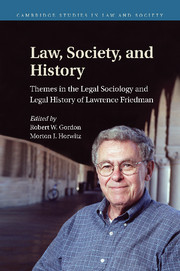Book contents
- Frontmatter
- Contents
- Contributors
- Introduction
- PART I OVERVIEWS AND ASSESSMENTS OF FRIEDMAN'S WORK
- PART II APPLICATIONS OF CONCEPTS, INSIGHTS, AND METHODS IN FRIEDMAN'S WORK
- PART III THE LEGAL PROFESSION
- PART IV LAW AND LARGE AREAS OF SOCIAL LIFE
- PART V FACTS FROM THE UNDERGROUND: DIGGING LEGAL HISTORY OUT OF THE CELLAR
- 16 Historian in the Cellar
- 17 The Discreet Charm of Inquisitorial Procedure
- 18 “Keep Negroes Out of Most Classes Where There Are a Large Number of Girls”
- 19 Taking Legal Realism Offshore
- PART VI PERSPECTIVES FROM OTHER CONCEPTUAL WORLDS
- Index
- Titles in the series
- References
17 - The Discreet Charm of Inquisitorial Procedure
Judges and Lawyers in a Case of Lèse Majesté in Late-Eighteenth-Century Venezuela
Published online by Cambridge University Press: 07 October 2011
- Frontmatter
- Contents
- Contributors
- Introduction
- PART I OVERVIEWS AND ASSESSMENTS OF FRIEDMAN'S WORK
- PART II APPLICATIONS OF CONCEPTS, INSIGHTS, AND METHODS IN FRIEDMAN'S WORK
- PART III THE LEGAL PROFESSION
- PART IV LAW AND LARGE AREAS OF SOCIAL LIFE
- PART V FACTS FROM THE UNDERGROUND: DIGGING LEGAL HISTORY OUT OF THE CELLAR
- 16 Historian in the Cellar
- 17 The Discreet Charm of Inquisitorial Procedure
- 18 “Keep Negroes Out of Most Classes Where There Are a Large Number of Girls”
- 19 Taking Legal Realism Offshore
- PART VI PERSPECTIVES FROM OTHER CONCEPTUAL WORLDS
- Index
- Titles in the series
- References
Summary
On July, 13, 1797, the regente (presiding officer) of the Real Audiencia de Caracas (the highest court in the province and most important government council), Antonio López de Quintana, acting on a tip, apprehended the prosperous businessman Manuel Montesinos Rico, searched his house, and discovered the existence of a conspiracy meant to repudiate the power of the Spanish monarchy and to establish an independent republic in what is today Venezuela. By so doing, the Audiencia initiated the most politically significant judicial case in the history of colonial Venezuela.
Soon the Audiencia discovered that the conspiracy was quite broad in scope, especially in the cities of La Guaira and its surroundings, including Caracas. Its leaders were Manuel Gual and José María España, which is why this episode is known as La Conspiración de Gual y España. Both men were prosperous landlords. Gual was a retired army captain; España was the administrator of one of the church's estates and the judge (corregidor) of Macuto, a small city near La Guaira. Other important figures in the conspiracy were businessmen José and Manuel Montesinos Rico, engineer Patricio Ronán, the priests Tomás Sandoval and Juan Agustín González, and the lawyer Luis Tomás Peraza. Like Ronán and the Montesinos Rico brothers, several conspirators were peninsular Spaniards; others were “creoles,” the term used for whites born and established in the province. There were also whites from lower social strata (blancos de orilla) and a good number of pardos (free, mixed-blood people).
- Type
- Chapter
- Information
- Law, Society, and HistoryThemes in the Legal Sociology and Legal History of Lawrence M. Friedman, pp. 293 - 308Publisher: Cambridge University PressPrint publication year: 2011



